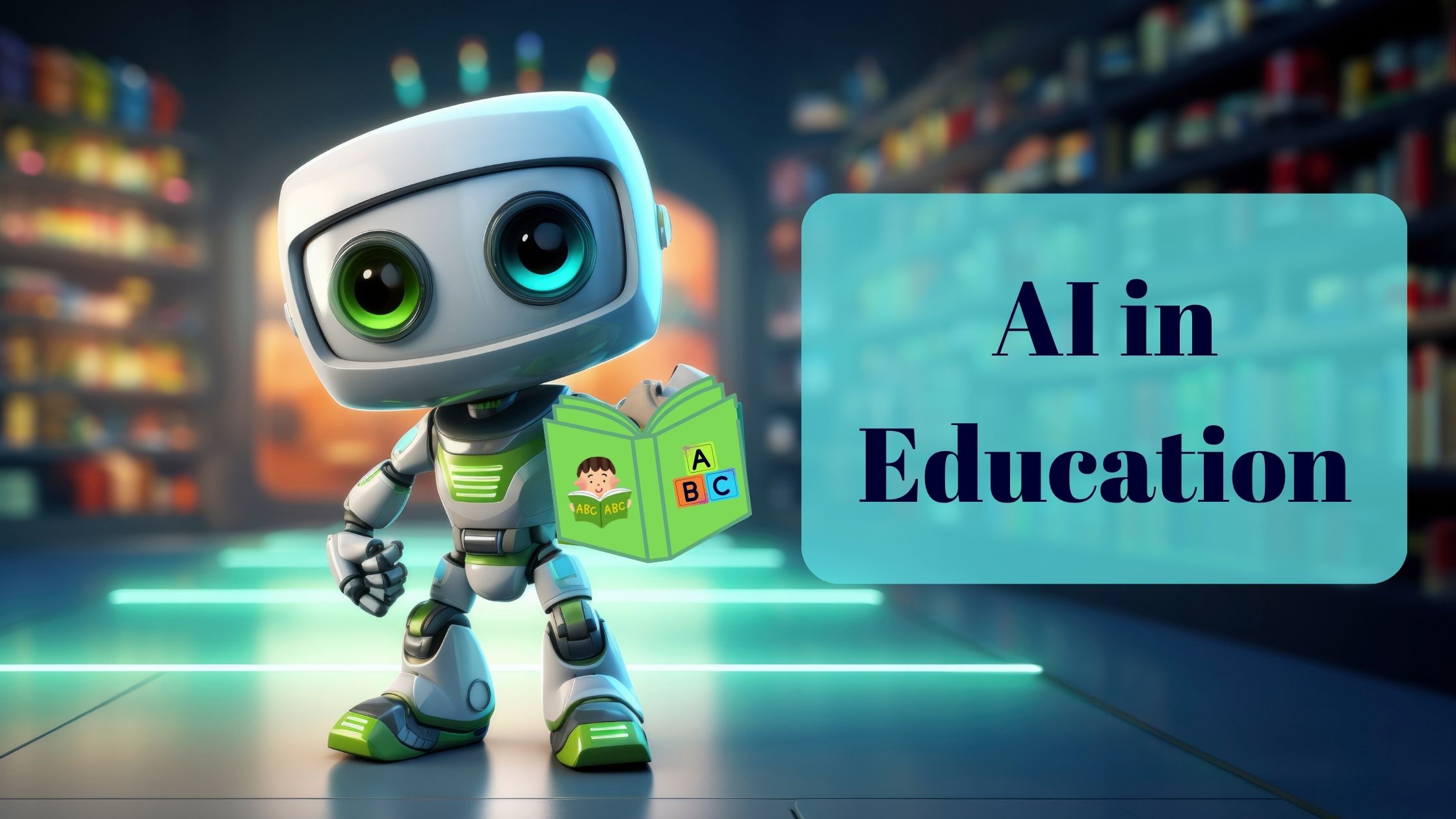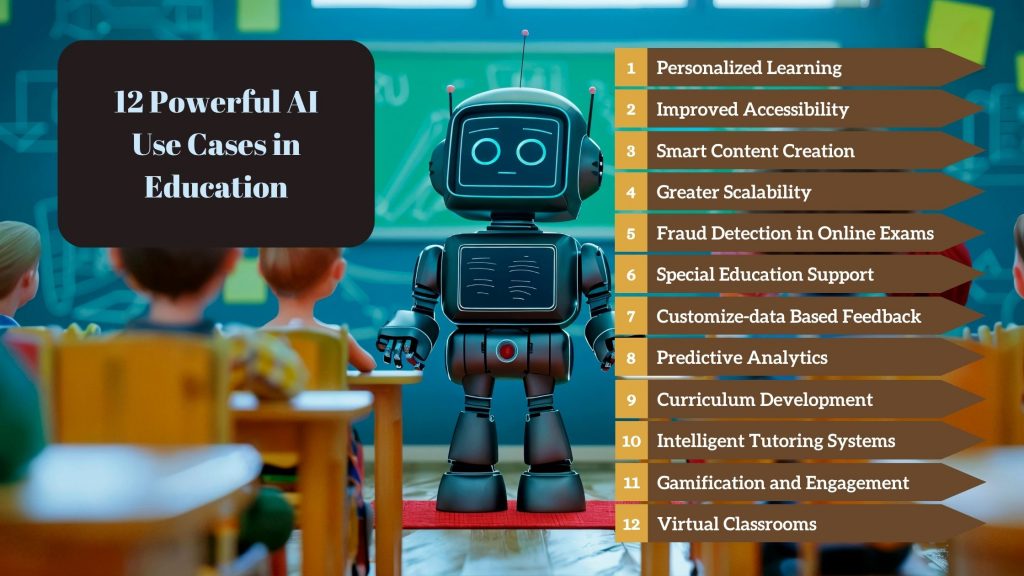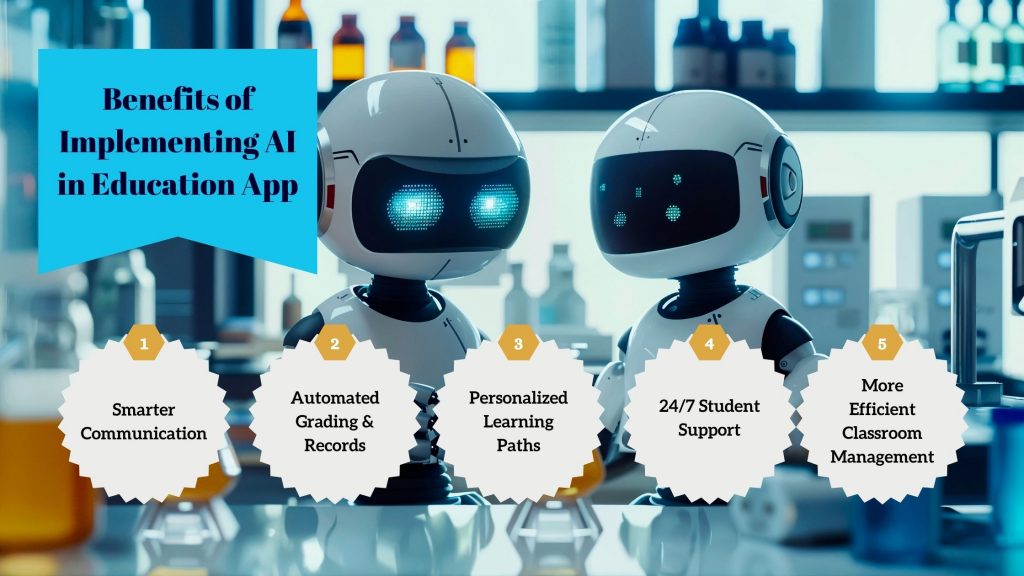
How Is AI in Education Transforming Modern Learning Experiences?

Artificial Intelligence (AI) is redefining the way we approach learning and development in today’s digital world. Just as AI has become an integral part of various fields like AI in sports or gaming AI, AI in education has also become a fundamental component transforming how we learn. From personalizing education to automating administrative tasks, the integration of education AI is rapidly transforming traditional classroom experiences into smart, efficient, and highly interactive learning environments.
The rise of AI in education isn’t just a passing trend—it marks a pivotal shift in the way educators and students interact with information. With growing accessibility to smart devices and internet connectivity, AI-powered systems are helping bridge gaps in quality education, democratizing learning opportunities worldwide.
The education industry, once known for its conventional methodologies, is now leveraging AI to enhance both teaching strategies and student engagement. From AI-powered learning tools that adapt to student progress to intelligent systems that support educators with insights and automation, the AI technology in education is reshaping the learning ecosystem at a fundamental level.
As we move further into a tech-centric future, understanding the significance, applications, and future possibilities of AI in the education industry becomes essential. In this blog, we’ll explore how AI is transforming the educational landscape, uncover real-world use cases, examine the key benefits of AI in education, and look ahead at what the future holds.
The Impact of AI on the Education Industry
The integration of AI in education is ushering in a profound transformation, affecting every layer of the educational framework—from institutional management to personalized student experiences. As digital learning continues to grow, AI emerges as a critical enabler in making education more efficient, inclusive, and outcome-driven.
One of the most significant shifts brought on by AI technology in education is the transition from a one-size-fits-all approach to a more tailored, data-informed model. With AI algorithms analyzing vast amounts of student data, educators can now uncover patterns in performance, behavior, and preferences, leading to better-targeted instruction and early intervention when learning gaps are detected.
Moreover, the AI in education industry is reducing the burden of administrative tasks. Teachers spend a considerable portion of their time grading assignments, managing records, and handling classroom logistics. AI-powered systems automate much of this workload, allowing educators to focus more on teaching and student interaction.
In higher education and skill-based learning, AI is also playing a role in bridging the gap between academic content and real-world applications. With predictive analytics and intelligent tutoring systems, students gain personalized roadmaps that align with career goals and learning pace—enhancing both engagement and employability.
Furthermore, AI facilitates inclusivity. From text-to-speech technologies to AI-based translators and real-time captioning, learners from diverse backgrounds and with varying abilities are now able to access quality education more easily than ever before.
In short, the impact of AI on the education industry is far-reaching. It is enabling educators to work smarter, not harder, while empowering students with resources that adapt to their unique needs. This revolution signals a brighter, more adaptive, and accessible future for global education.
Interested in AI-Powered Learning Tools for Education?
Explore innovative ways AI can enhance accessibility and student success.
How AI is Revolutionizing the Education Space – 12 Use Cases

Custom Artificial Intelligence is not just enhancing education—it’s reinventing it. Below are twelve real-world use cases that highlight how AI is creating smarter, more responsive learning environments.
Personalized Learning
AI enables personalized learning experiences by analyzing each student’s performance, learning pace, and behavior patterns. Adaptive algorithms adjust the difficulty and style of content delivery based on individual needs.
For example, a student struggling with math concepts may receive simplified explanations and additional practice problems, while advanced learners are guided toward more challenging tasks. This makes AI-powered learning tools especially effective in maximizing student engagement and academic outcomes.
Improved Accessibility
AI technology in education is breaking down barriers for learners with disabilities or language differences. Tools such as voice recognition, real-time translation, and text-to-speech help students with visual, auditory, or linguistic challenges participate in lessons more independently.
For instance, an AI-driven translator can assist a non-native English speaker in understanding complex concepts in their preferred language, fostering inclusivity in both classrooms and online learning environments.
Smart Content Creation
AI simplifies the process of content creation by helping educators develop interactive learning materials, quizzes, and study guides based on curriculum requirements. It can even summarize textbook chapters, generate flashcards, or turn raw data into visual presentations. This not only saves time but also ensures consistency in educational content.
As a result, students benefit from more engaging and diverse study resources powered by AI.
Greater Scalability
AI allows educational institutions to reach a much larger number of students without compromising on the quality of learning. Unlike traditional classrooms limited by physical space and teacher availability, AI-powered platforms can serve thousands of learners simultaneously.
This scalability is especially valuable for online courses and remote learning, enabling students worldwide to access personalized education regardless of location.
By automating content delivery and adapting lessons to individual needs at scale, AI ensures that every student receives attention suited to their progress. It also helps educators manage larger classes effectively, making education more accessible on a global scale.
Fraud Detection in Online Exams
Online exams bring convenience but also raise concerns about cheating and impersonation. AI addresses these issues by using facial recognition, behavior tracking, and biometric verification to monitor exam takers. This real-time surveillance helps detect suspicious activities like looking away from the screen frequently or the presence of unauthorized materials.
Such AI technology in education enhances trust in remote assessments by ensuring the student’s identity and honesty during exams. This is crucial for maintaining academic standards in an increasingly digital education environment.
Special Education Support
AI is making significant strides in supporting students with special needs by providing customized learning aids. Tools like speech-to-text and text-to-speech help learners with dyslexia or visual impairments engage with content more effectively. Similarly, predictive text and language assistance tools help those with writing difficulties improve communication.
Additionally, emotion recognition AI can help educators understand and respond to the emotional and social cues of students with autism or other cognitive challenges. These applications promote inclusivity by tailoring education to individual abilities.
Customize-data Based Feedback
AI systems analyze student performance and provide tailored feedback based on data insights. Instead of generic comments, students receive specific guidance on their strengths and areas for improvement. This feedback loop helps learners stay motivated and focus on concepts they struggle with, creating a more effective learning experience.
Educators also benefit by gaining insights into class-wide trends, allowing them to adjust their teaching strategies and address common difficulties in real-time, improving overall educational outcomes.
Predictive Analytics
Predictive analytics uses AI to forecast student performance and identify those at risk of falling behind or dropping out. By examining past data such as attendance, grades, and engagement, AI models can alert educators early, enabling timely interventions.
This proactive approach improves retention rates and supports personalized learning plans, ensuring students get the help they need before problems escalate.
Curriculum Development
AI assists in designing curricula by analyzing vast amounts of educational data and identifying skills gaps or emerging trends in various fields. This helps educators develop up-to-date and relevant course materials that meet industry demands and student needs.
Moreover, AI can suggest modifications to content pacing and difficulty, creating a dynamic curriculum that adapts to changing educational requirements.
Intelligent Tutoring Systems
Intelligent tutoring systems use AI to simulate one-on-one tutoring by providing personalized guidance and support to students. These systems can understand student responses, identify misconceptions, and offer targeted hints or explanations to help learners progress.
By mimicking a human tutor’s approach, AI tutoring systems make learning more interactive and responsive, which improves student understanding and retention.
Gamification and Engagement
AI enhances student engagement by integrating gamification elements such as points, badges, and interactive challenges into learning platforms. These AI-powered systems adapt the difficulty level to keep students motivated and prevent frustration.
This approach turns learning into a fun, game-like experience, encouraging students to participate actively and consistently in their education.
Virtual Classrooms
Virtual classrooms powered by AI offer immersive and interactive learning environments accessible from anywhere. AI tools facilitate real-time communication, personalized content delivery, and automated attendance tracking.
Such classrooms break geographical barriers and provide flexibility, making education more accessible and convenient for both students and teachers.
Looking to Implement AI in Education for Your Institution?
See how AI-powered learning tools can enhance student engagement and outcomes.
Benefits of Implementing AI in Education App

The integration of AI in education apps is transforming how students learn and how educators teach. AI-powered education apps offer numerous benefits that enhance the overall learning experience by making it more personalized, efficient, and accessible. Below are some of the key benefits of AI in education apps that are shaping the future of learning.
Smarter Communication
AI-enabled education apps facilitate smarter communication between students, teachers, and parents. Intelligent chatbots and virtual assistants are available 24/7 to answer queries, provide guidance, and offer instant support. These tools can handle routine questions, freeing up educators to focus on more complex tasks. Additionally, AI can analyze communication patterns to identify students who may need extra help or encouragement, promoting timely intervention.
Automated Grading & Records
One of the most time-consuming tasks for educators is grading assignments and maintaining records. AI-powered apps automate this process by instantly grading quizzes, essays, and assignments using natural language processing solutions and pattern recognition techniques. This automation not only saves valuable time but also ensures consistent and unbiased evaluation. Moreover, digital record-keeping reduces paperwork and allows easy tracking of student progress over time.
Personalized Learning Paths
AI-driven education apps can create personalized learning paths tailored to each student’s abilities, interests, and learning style. By continuously assessing student performance, the app adjusts lesson plans and resources to suit individual needs. This customization helps students learn at their own pace, improving knowledge retention and reducing frustration. It also supports diverse learning preferences, making education more inclusive.
24/7 Student Support
AI-powered apps provide round-the-clock assistance, allowing students to access learning materials and support whenever they need it. Virtual tutors and chatbots can answer questions, provide explanations, and guide students through difficult topics outside regular class hours. This continuous availability ensures that learning is not limited by time or location, promoting self-paced education.
More Efficient Classroom Management
AI apps assist teachers in managing classrooms more effectively by automating administrative tasks such as attendance tracking, scheduling, and performance monitoring. By analyzing student data, these apps help educators identify behavioral patterns and learning difficulties early on. This insight allows teachers to tailor interventions and optimize classroom dynamics, leading to a more productive and supportive learning environment.
The Future of AI Education App
The future of AI education apps looks incredibly promising as technology continues to evolve rapidly. These apps are expected to become even more intelligent, adaptive, and integrated into every aspect of learning and teaching. With advances in machine learning services, natural language processing, and data analytics, AI education apps will deliver more personalized, engaging, and efficient educational experiences.
One major trend is the increased use of AI to predict learning outcomes and provide early warnings for students at risk of falling behind. This will enable timely interventions tailored to each student’s unique needs. Additionally, AI will play a key role in creating immersive learning environments through virtual and augmented reality, making education more interactive and enjoyable.
Furthermore, as AI-powered learning tools become more sophisticated, they will seamlessly integrate with other educational technologies and platforms, offering a unified learning ecosystem. This integration will allow educators to track progress, adjust teaching methods, and access a wealth of resources effortlessly. Ultimately, AI education apps will empower both students and teachers to unlock their full potential, revolutionizing education on a global scale.
How BigDataCentric Custom AI Solutions Can Help You Achieve Education Excellence?
BigDataCentric specializes in delivering tailored AI in education industry solutions designed to transform traditional learning models into dynamic, efficient, and personalized experiences. By leveraging cutting-edge AI technology in education, BigDataCentric helps institutions and edtech companies develop smart, scalable, and user-friendly education apps that cater to diverse learning needs.
Our custom AI solutions include developing AI-powered learning tools that personalize content delivery, automate administrative tasks, and provide insightful analytics for educators. We focus on creating applications that improve student engagement, enhance accessibility, and facilitate real-time feedback. Whether it’s implementing intelligent tutoring systems, predictive analytics, or automated grading, BigDataCentric’s expertise ensures your education platform remains at the forefront of innovation.
Connect with BigDataCentric means gaining access to a team committed to education excellence. We provide end-to-end support—from initial consultation and development to deployment and ongoing optimization—helping you harness the full benefits of AI in education and stay competitive in a rapidly evolving market.
Want Smarter Education with AI?
BigDataCentric offers AI-driven tools to boost student engagement and academic success.
Last Word
AI in education is no longer a futuristic concept—it is actively reshaping how students learn and educators teach today. The integration of AI technology in education offers numerous benefits, from personalized learning and improved accessibility to smarter classroom management and predictive analytics. As the education sector continues to embrace these innovations, AI-powered learning tools will play an essential role in creating more inclusive, effective, and scalable education systems.
With the right AI solutions, institutions can unlock new opportunities for student success and operational efficiency. Whether you are an educator, edtech developer, or institution leader, adopting AI in education is a strategic step toward achieving excellence and preparing learners for a rapidly changing world.
FAQs
-
Is AI replacing teachers or just assisting them?
AI is not replacing teachers but assisting them by automating administrative tasks, offering personalized learning paths, and providing real-time analytics. Teachers remain essential for mentoring, emotional support, and creative instruction.
-
Are there any risks or challenges associated with AI in education?
Yes, risks include data privacy concerns, algorithmic bias, over-reliance on automation, and unequal access to AI tools. Ensuring ethical implementation and human oversight is crucial to mitigate these challenges.
-
How is AI currently being used in higher education?
AI is used in higher education for automating grading, delivering personalized content, supporting virtual tutors, predicting student performance, and enhancing administrative efficiency. It also helps in research analysis and plagiarism detection.
-
What role does AI play in gamification of education?
AI enhances gamification by adapting game difficulty to learner levels, tracking progress, and providing instant feedback. It helps create interactive, personalized learning experiences that boost student motivation and engagement.
-
What is an example of AI personalized learning?
An example of AI personalized learning is Duolingo, a language-learning app that adapts lessons based on a user’s progress, strengths, and mistakes. It uses AI to adjust the difficulty, repeat weak areas, and optimize the learning path for each individual, ensuring a customized learning experience.

About Author
Jayanti Katariya is the CEO of BigDataCentric, a leading provider of AI, machine learning, data science, and business intelligence solutions. With 18+ years of industry experience, he has been at the forefront of helping businesses unlock growth through data-driven insights. Passionate about developing creative technology solutions from a young age, he pursued an engineering degree to further this interest. Under his leadership, BigDataCentric delivers tailored AI and analytics solutions to optimize business processes. His expertise drives innovation in data science, enabling organizations to make smarter, data-backed decisions.
Table of Contents
ToggleHere's what you will get after submitting your project details:
- A strict non-disclosure policy.
- Get in discuss with our experts.
- Get a free consultation.
- Turn your idea into an exceptional app.
- Suggestions on revenue models & planning.
- No obligation proposal.
- Action plan to start your project.
- We respond to you within 8 hours.
- Detailed articulate email updates within 24 hours.
Our Offices
USA
500 N Michigan Avenue, #600,Chicago IL 60611




